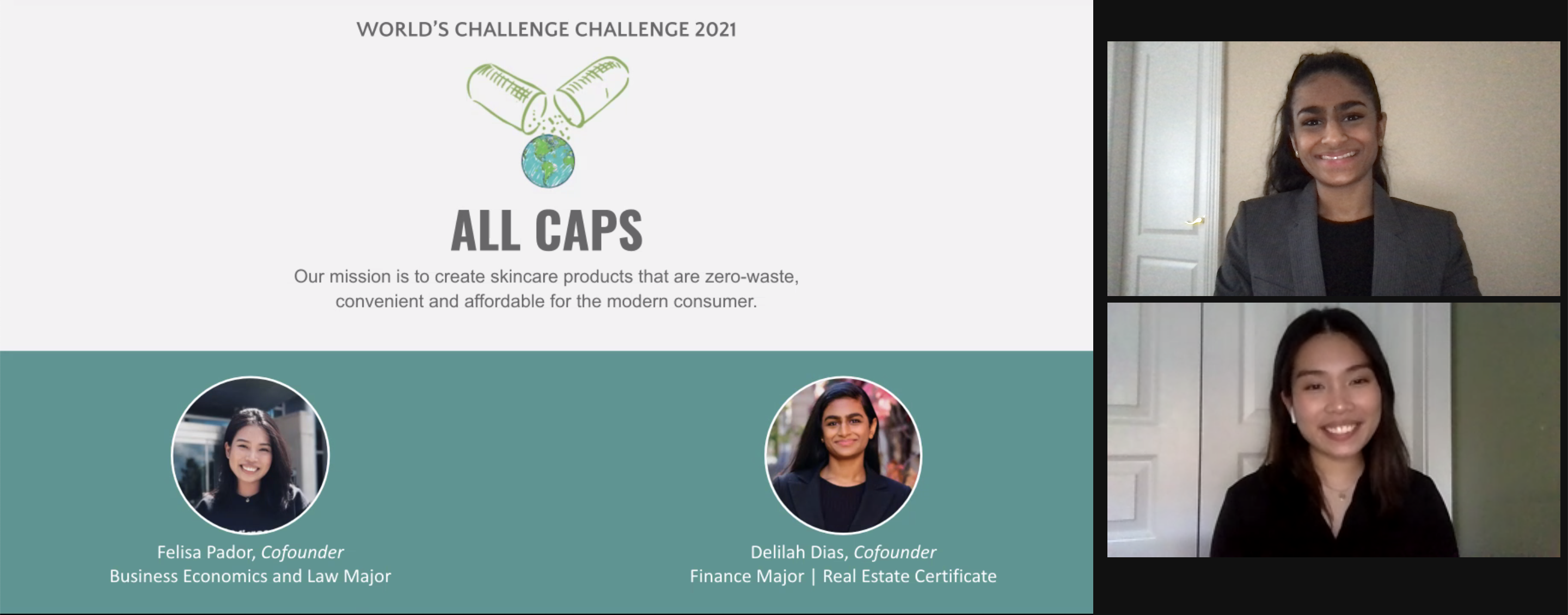Putting a Cap on Waste: Two UAlberta Students Plan to Reduce Harmful Packaging Materials in the Beauty Industry
Saba Al Hammouri - 22 April 2021

Delilah Dias and Felisa Pador presenting their project ALL CAPS at the 2021 Virtual WCC
If you have visited a beauty counter or drug store in recent years, you are sure to have noticed a plethora of skincare products on display. Skincare regimens are continually evolving and becoming more complex; some involve as many as 12 steps.
As skincare enthusiasts and environmental advocates, UAlberta business students Felisa Pador and Delilah Dias were concerned about this trend in the beauty industry. After compiling all the skincare products they had used over the past six months, they had roughly 30 non-biodegradable bottles on hand.
"In Canada, cosmetic companies are the third-largest buyers of packaging," Pador explains. "In 2019, 550 million units of packaging materials were purchased by Canadians for skincare alone, keeping in mind that only 10% of plastic products are successfully recycled."
Aware of the environmental impacts of the excess packaging, Pador and Dias knew they had to develop an alternative solution. Together, they came up with ALL CAPS, skincare products contained in single-serving capsules.
The goal of ALL CAPS is two-fold: educate customers about how the abundance of non-biodegradable packaging has negatively affected our planet, and target and eliminate the use of non-biodegradable materials in the beauty industry.
"Our market research has recognized a need for natural skincare [products] contained in 100% biodegradable packaging without sacrificing convenience or usability," Dias states. "We hope that ALL CAPS will be a high-quality alternative for unsustainable products in the market."
In an effort to make their goal a reality, Pador and Dias signed up for the World's Challenge Challenge.
Marking its fifth year at the University of Alberta, the World's Challenge Challenge (WCC) encourages students from all faculties to present ideas that aim to achieve the UN's Sustainable Development Goals. The winners of the WCC are awarded $10,000 and the opportunity to pitch their ideas at the Global Finals at Western University.
Along with other students in the competition, Pador and Dias received support and mentorship from organizations such as Startup Edmonton, who helped the duo refine their pitch for the WCC finals. "Their thoughtful feedback was extremely useful for refining our project," Pador expresses. "As well, their words of encouragement and support made us feel more confident competing internationally."
International competition for Pador and Dias is not far off. Their innovative solution, which tackled SDG 12, Responsible Consumption & Production and SDG 13, Climate Change, landed them the win at the WCC.
Pador and Dias will soon be competing at Western University for the opportunity to win an additional $30,000 to take their project to the next step. Joining the pair at Western will be Fentagone, last year's WCC winners, who recently won $100,000 at the Telus Innovation Challenge.
As for what's next for ALL CAPS, Pador and Dias say they are excited for what's ahead. The WCC was a great starting point for the team. According to both students, the WCC was a learning opportunity that gave them renewed energy and new ideas on improving and growing their project. It gave them the vote of confidence and encouragement to make their idea a reality.
"We are excited to bring this project to life and also grow as entrepreneurs," Dias concludes.